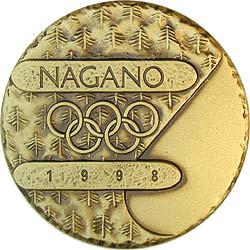|

|

|
|
|
|
|
|
Medal Information |
| |
Summer Olympics
1896 Athens, Greece
1900 Paris, France
1904 St.Louis, USA
1906 Athens, Greece
1908 London, England
1912 Stockholm, Sweeden
1920 Antwerp, Belgium
1924 Paris, France
1928 Amsterdam, Netherlands
1932 Los Angeles, USA
1936 Berlin, Germany
1948 London, England
1952 Helsinki, Finland
1956 Melbourne, Australia
1960 Rome, Italy
1964 Tokyo, Japan
1968 Mexico City, Mexico
1972 Munich, Germany
1976 Montreal, Canada
1980 Moscow, USSR
1984 Los Angeles, USA
1988 Seoul, Korea
1992 Barcelona, Spain
1996 Atlanta, USA
2000 Sydney, Australia
Winter Olympics
1924 Chamonix, France
1928 St.Moritz, Switzerland
1932 Lake Placid, USA
1936 Garmisch, Germany
1948 St.Moritz, Switzerland
1952 Oslo, Norway
1956 Cortina, Italy
1960 Squaw Valley, USA
1964 Innsbruck, Austria
1968 Grenoble, France
1972 Sapporo, Japan
1976 Innsbruck, Austria
1980 Lake Placid, USA
1984 Sarajevo, Yugoslavia
1988 Calgary, Canada
1992 Albertville, France
1994 Lillehammer, Norway
1998 Nagano, Japan
2002 Salt Lake City, USA
| |
|
|
|
|
1998 WINTER OLYMPIAD
NAGANO, JAPAN
|

Hold mouse over image to view reverse.
If the image does not load, simply hit refresh.
|
Composition: | Gold Bronze |
Shape: | Round |
Diameter: | 60 mm |
Thickness: | 7.3 mm |
Weight: | 132 grams |
Edge: | Plain |
Mintage: | 10,000 ? |
|
|
| DESCRIPTION |
The outline of a ski slope bordered by trees with the words NAGANO & 1998 separated by the Olympic rings. The reverse has a textured edge with the Nagano emblem and legend THE XVIII OLYMPIC WINTER GAMES, / NAGANO 1998 in the center. The medals were struck by at least a couple different manufacturers lending to some slight variations in color. The medals were presented in a foam holder encased with a white cardboard sleeve.
|
THE GAMES |
In 1998 the Winter Olympic Games returned to Japan after 26 years. Snowboarding and curling debuted as official sports and women’s ice hockey was introduced to the Olympic program. For the first time, the men’s ice hockey tournament was opened to all professionals. The inspired team from the Czech Republic scored a surprise victory. Björn Dählie won three gold medals in Nordic skiing to become the first winter athlete to earn eight career gold medals and twelve total medals. Tara Lipinski won the women’s figure skating title to become, at 15, the youngest champion in an individual event in the history of the Winter Olympics. The spirit of the Games was exemplified by Alpine skier Hermann Maier. Maier survived a spectacular fall in the downhill, recovered and earned gold medals in both the super-g and the giant slalom.
|
|
|
| |
